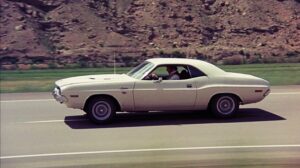Vanishing Point (1971) review
Dir. Richard C. Sarafian
By: Steve Pulaski
Rating: ★★★
If you ever lamented how action movies seemingly sideline “the good stuff” (i.e. car chases, action set-pieces) for trivialities such as plot and character development, consider Vanishing Point not only a distillation of the genre’s most primal attributes, but also the thesis of a descriptor often used to describe albums: all killer, no filler.
Richard C. Sarafian’s film was doomed to fail in America thanks to a lack of belief from folks at Fox. Ironically, its success in the UK prompted Fox to retest it as a drive-in staple, and now it’s considered one of the finest car-centric action movies of its era. Unlike Easy Rider or Two-Lane Blacktop, Vanishing Point doesn’t require a deep understanding of its time period. It doesn’t feel like a relic of its era. It can be enjoyed on its merits, for to its credit it doesn’t require your complete and total attention.
The whole film is a chase that starts in Colorado. Kowalski (Barry Newman) is supposed to deliver a white 1970 Dodge Challenger R/T 440 Magnum from Denver to San Francisco, and tells his colleague that he can get it to Cali by 3pm Sunday (it’s already almost Saturday morning when he peels off). It’s not long before the cops are on his tail due to his excessive speeds, but they are always left at the border of another state in a cloud of smoke, unable to catch up with the mysterious drifter who would’ve fit a nickname a bum once gave Butt-Head: Mr. Goodnight Hairdo.

Because Kowalski is less a character and more just the human assigned to punch the gas pedal of his Challenger, some of the film’s most kinetic energy is supplied by Super Soul (the great Cleavon Little), a blind, Black radio DJ who covers Kowalski like a modern folk hero the second he gets wind of the multistate police chase. Super Soul goes on monologues about Kowalski’s status as a cultural figure to be revered and honored; “The last American to whom speed means freedom of the soul.”
Kowalski’s western odyssey is filled with asides, be it agile turns that lead to police pileups, or the occasional run-in with another drifter, such as a prospector (Dean Jagger) who supplies him with more fuel. Sarafian lets images of Kowalski tearin’ ass all over the dusty highways and byways of America breathe, capturing them from low-angles, intense close-ups, or, my personal favorite, the extreme long-shot that shows his Challenger, the road traveled, the oncoming road, the sky, and the horizon all in gorgeous detail.
The closest screenwriter Guillermo Cain comes to evoking some kind of external relevance with Vanishing Point‘s script is in Super Soul’s radio diatribes. There was a palpable starvation for some kind of hero for the everyman in the 1970s social climate. Someone removed not just from the political spectrum, but seemingly unafraid to engage in vehicular combat, so to speak, with anything that happened to get in his way. Kowalski’s comparable emptiness as a character is more indicative of the film’s approach to its material. This is a mood movie, and the mood is aggressive yet serene, a more surface-level examination of rugged individualism that discards everything from rules of law to the laws of physics.
Starring: Barry Newman, Cleavon Little, and Dean Jagger. Directed by: Richard C. Sarafian.
About Steve Pulaski
Steve Pulaski has been reviewing movies since 2009 for a barrage of different outlets. He graduated North Central College in 2018 and currently works as an on-air radio personality. He also hosts a weekly movie podcast called "Sleepless with Steve," dedicated to film and the film industry, on his YouTube channel. In addition to writing, he's a die-hard Chicago Bears fan and has two cats, appropriately named Siskel and Ebert!


